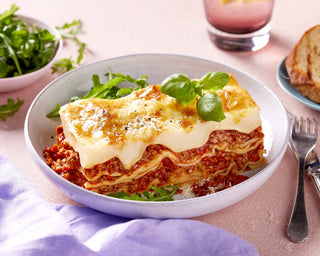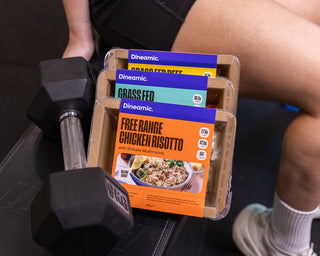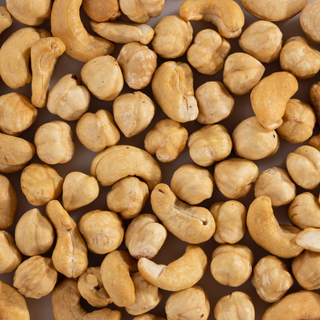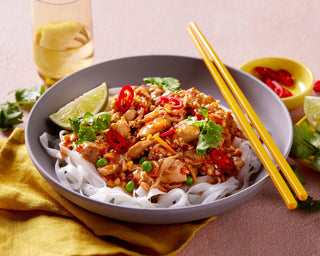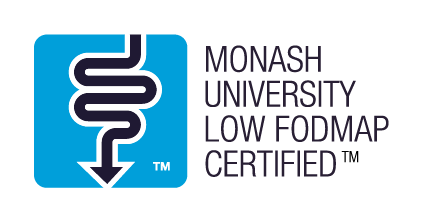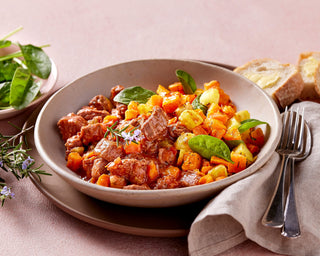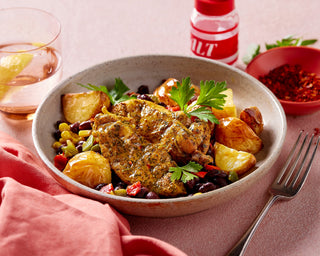
So you’re wondering how to get more protein when following a plant-based or vegetarian diet? Lucky for you, we’ve got some great go-tos (and delicious Dineamic meals!) to make sure you get your protein hit.
Protein isn’t just an important nutrient for gym junkies and HIIT addicts. Protein is an essential nutrient your body needs to build and repair muscle tissue - whether that’s from lifting a few weights, taking a light jog around the park, being a busy parent…or anything in between!
How much protein do you need?
If you’re a protein lover, you may think all the extra protein you’re getting from protein shakes and supplements is going to have you looking like Dwayne ‘The Rock’ Johnson…but, the reality is most of us don’t need the extra protein - and it leaves the body as waste.
Government’s guidelines recommend that men aged between 19 to 70 need 0.84g of protein per kilogram of body weight per day. For women, it’s 0.75g per kilogram. So for instance, if a woman weighs 70kg, her recommended intake is approximately 52g. Of course if you are an athlete or doing heaps of training you will need more.
Getting the required protein is easy when you do a little planning, and include some high-protein vegan or vegetarian foods in your diet. It’s also important to eat an array of different plant proteins to ensure you’re eating all nine essential amino acids. Plant proteins - besides tofu - do not contain all nine. Vary where you get your protein from, you can get all nine by eating corn and beans together, or rice and beans for example.
So let's jump in.
Lentils
The humble little lentil. These legumes pack a punch! A cup of lentils contains about 18 grams of protein. They’re great in salads, soups, dahls and so much more. Including lentils in your diet may also help with heart health and keeping your body working well. What’s not to love about lentils?!
Looking for a delicious Dineamic meal packed full of lentils? Try our hearty Lentil & Mushroom Bolognese.
Chickpeas
Want to know what gets our pulses racing? It’s the charming chickpea, of course. Chickpeas contain about 15 grams of protein per cup. They are a great source of nutritious carbs and are rich in soluble fibre as well as containing a bunch of other vitamins and minerals like iron and zinc.
Chickpeas are great in salads. Interested in trying one of ours? Check out our Mexican Chickpea Salad.
Kidney Beans
Kidney beans are rich in protein. 100 grams of cooked kidney beans has about 9 grams of protein. These tasty beans also contain a lot of fibre which is so important to keep our gut working well and the soluble fibre helps to regulate blood sugar levels .
These versatile beans are great for stews, soups, salads and more.
Quinoa
It’s the ancient grain that’s a modern day hit. Regardless of whether you pronounce it ‘kin-wa’ or ‘kin-oa’, Quinoa is a great plant-based source of protein with about 9 grams per cooked cup. Quinoa is also a great source of nutritious carbs, fibre, is a plant source of omega 3 fats iron, manganese, phosphorus and magnesium. Quinoa is also gluten free
Wondering what delicious veggie dishes are great with quinoa? Try our Minestrone & Quinoa Soup, a little twist on an Italian classic. Or try our Vegetable Taco Hash, both nourishing and delicious!
Wild Rice
Rice is a staple of so many diets around the world. There is one way to get some more protein from your rice though. Make it ‘wild’. No, we’re not suggesting you pack for a safari trip and see if you happen to stumble across a rice paddy in southern Africa. We’re talking about wild rice, which has 1.5 times as much protein as other rice varieties - including brown rice.
Need a great protein-packed side? Try our Wild Rice Blend, an earthy blend of wild rice, brown rice and quinoa. And why not pair it up with our delicious Sweet Potato & Coconut Curry?
Nuts & Seeds
Nuts and seeds are a great source of protein, fibre and healthy fats. Raw, unblanched nuts are best, as roasting can damage some of the nutrients of nuts. Depending on the nut or seed you’re having, you’ll get around 5 to 7 grams of protein per 28 gram serve. Walnuts, cashews and almonds are popular varieties that have high protein content and walnuts are a source of omega 3s .
Need a healthy, delicious snack that packs a bit of protein? Serve up your morning cuppa or coffee with one of our scrumptious Date & Almond Power Balls, or try our Cashew & Honey Power Balls.
Freekeh
There’s nothing freaky about freekeh. Freekeh is high in protein and fibre. It also has the added benefit of being low in fat, but a good source of nutritious carbs helping to keep you feeling full for longer. This supergrain is becoming more and more popular, and for good reason too - it also contains calcium, magnesium, zinc and B vitamins.
Want to try this super grain and see what all the fuss is about? Try our Cypriot Salad. It’s also packed full of other grains, fresh herbs, nuts and seeds.
Broccoli
Generally speaking, fruits and vegetables are low in protein. However, some certainly have more than others - and one of those is brilliant broccoli. A cup of broccoli contains about 5 grams of protein. You’ll feel like a broc-star, as this vege is full of antioxidant power
Everyone knows that green is good. Try our Broccoli, Spinach & Kale Soup, packed full of delicious green goodness. Or serve up your dishes with a side of our Broccoli, Cauliflower & Brown Rice Blend.
So there you have it
Despite what society tells us, a study comparing the nutrient consumption of meat-eaters and plant-eaters revealed that plant-eaters can get enough protein, they get 70% more than they need! Ironically, meat-eaters who claim you ‘can’t get enough protein from a plant-based diet’ even get about 50% of their protein from plants.
We hope you’re inspired to include some of these plant protein-packed foods in your diet. And excited to try some of our delicious and perfectly portioned Dineamic meals too.
Shop the full range of vegan Dineamic meals here, and vegetarian meals here.


